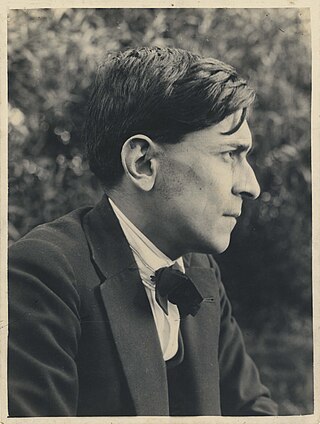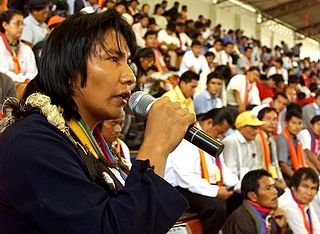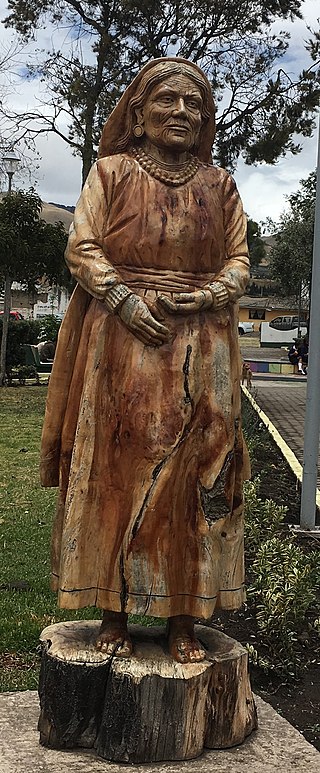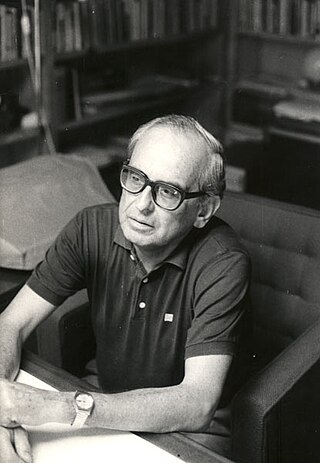
José Carlos Mariátegui La Chira was a Peruvian writer, journalist, politician and Marxist–Leninist philosopher.

The Confederation of Indigenous Nationalities of Ecuador or, more commonly, CONAIE, is Ecuador's largest indigenous rights organization. The Ecuadorian Indian movement under the leadership of CONAIE is often cited as the best-organized and most influential Indigenous movement in Latin America.

The Pachakutik Plurinational Unity Movement – New Country is a left-wing indigenist party in Ecuador. It was founded primarily as a way to advance the interests of a wide variety of indigenous peoples' organizations throughout Ecuador.

The Patriotic Society Party, formerly the January 21 Patriotic Society is a populist and personalist political party in Ecuador, led by former army colonel Lucio Gutiérrez. "January 21" refers to the date of the 2000 Ecuadorian coup d'état.

Jose Manuel de los Reyes González de Prada y Ulloa was a Peruvian politician and anarchist, literary critic and director of the National Library of Peru. The first writer to criticize the oligarchy within Peru, he is well remembered as a social critic who helped develop Peruvian intellectual thought in the early twentieth century, as well as the academic style known as modernismo.
The Ethics and Democracy Network was a centre-left political party in Ecuador. It was formed by labour union leaders and other leftist militants, led by León Roldós, former vice-president and brother of former president Jaime Roldós, who came from the Ecuadorian Socialist Party. For the October 2006 elections, RED entered into an alliance with the Democratic Left party, to support the candidacy of León Roldós and running mate Ramiro González, former Prefect of the Pichincha Province. The alliance's presidential ticket came in fourth place with 14.8% of the votes, while RED won 5 of 100 seats in Congress.

Dolores Cacuango, also known as Mamá Doloreyuk, was a pioneer in the fight for indigenous and farmers rights in Ecuador. She stood out in the political arena and was one of the first activists of Ecuadorian feminism, between '30s and '60s. She founded the Federación Ecuatoriana de Indios (FEI) in 1944 with the help of Ecuador's Communist Party.
Jorge Villacorta is a Peruvian art critic and independent curator, with a strong interest in contemporary visual arts. He is also the co-founder and academic director of Alta Tecnologia Andina.
José-Carlos Mariátegui is a scientist, writer, curator and scholar on culture, new media and technology. Born in 1975, he is the son of Peruvian psychiatrist Javier Mariategui and the grandson of Jose Carlos Mariategui, the most influential Latin American Marxist thinker of the 20th century. He studied Mathematics and Biology at Cayetano Heredia University in Lima, Perú and did both Masters and Doctoral degrees in Information Systems and Innovation from the London School of Economics and Political Science – LSE (London). His PhD, dated 2013, was titled Image, information and changing work practices: the case of the BBC’s Digital Media Initiative. Has been involved in teaching and research activities, as well as published a variety of articles on art, science, technology, society and development. He founded Alta Tecnología Andina (ATA), non-profit organization dedicated to the development and research of artistic and scientific theories in Latin America. Founder of the International Festival of Video and Electronic Art in Lima (1998–2003). Founding Director of the Memorial Museum of José Carlos Mariátegui of the Ministry of Culture in Peru.

Javier Mariátegui Chiappe was a renowned Peruvian intellectual and psychiatrist. He was the last of the children of José Carlos Mariátegui and Anna Chiappe. Studied at the University of San Marcos where he also started teaching; he was also a founder of Cayetano Heredia University. He was also the founding director of the National Institute of Mental Health “Honorio Delgado - Hideyo Noguchi”. He died in Lima.
Oscar Terán was an Argentinean philosopher.
Seven Interpretive Essays on Peruvian Reality, published in 1928, is the most famous written work of the Peruvian socialist writer José Carlos Mariátegui and considered his magnum opus. It was published in Lima, in 1928, and is accredited to establishing its author as one of the most widespread Marxist voices in Latin America. It is a work that has been reissued dozens of times, in addition to being translated into Russian, French, English, Italian, Portuguese and Hungarian.

Ádám Anderle was a Hungarian historian, hispanist, full (university) professor, professor emeritus of Faculty of Arts, University of Szeged (SZTE). He was active in research of the relationship between Latin America and Hungary for decades. He was fluent in Hungarian and Spanish.
María Luisa Gómez de la Torre Páez was an Ecuadorian feminist, educator, and activist. She was a pioneer in the struggle for the rights of the indigenous peoples and peasants in Ecuador. She was the first woman to serve as a teacher for boys in Quito.
Marc Edelman is an academic author and professor of anthropology at Hunter College and the Graduate Center of the City University of New York. He was president of the American Ethnological Society from 2017 to 2019.
Esteban Pavletich Trujillo was a Croatian-Peruvian writer, journalist, and political activist.
Jesús María Isabel Romero Wiesse was a Peruvian poet, writer, essayist, anthologist, and film critic.

Mabel Moraña is a renowned intellectual and academic who has worked internationally in the fields of literary and cultural criticism in Latin America, being the author of numerous interdisciplinary publications that articulate perspectives on Philosophy, Anthropology, History, and Cultural Theory. Currently she is the William H. Gass Professor in Arts and Sciences at Washington University in St. Louis. She is also the Director of the Latin American Studies Program at the same institution. Her research work spans from the Colonial Period, particularly focusing on the Baroque, to the present. Her main contributions are in the areas of the study of national cultures, modernity, postcolonialism, and the history of ideas. Moraña has published articles and books on Andean cultures, Mexican literature and culture, as well as transnational issues. She has contributed to the critical development of categories such as the monstrous, migration, violence, issues related to gender, race and ethnicity, critiques of modernity, postcolonial theory, among other topics.